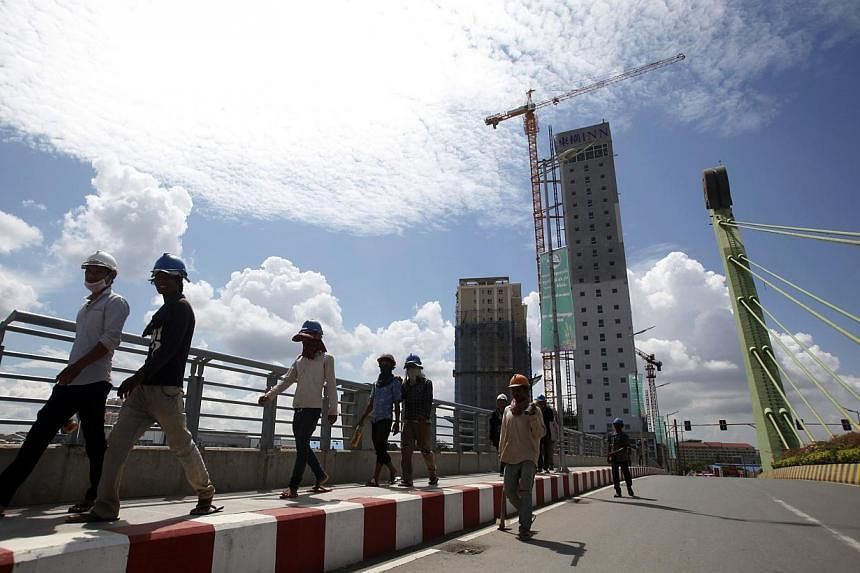As China's economy continues to slow, businesses may find new opportunities in South-east Asia as the Asean Economic Community's (AEC) end-of-2015 launch date approaches. The AEC promises a 10-nation market and new opportunities and returns. Yet, investor beware.
The findings of the recently released World Bank 2015 Doing Business survey make abundantly clear that not all is well in many parts of South-east Asia. While Singapore continues to rank No. 1 in the world for ease of doing business, many of the region's so-called frontier economies continue to be characterised by pervasive corruption, and weak governance and rule of law.
But opportunity exists even on the frontiers. In Cambodia's capital, billboards from multinational businesses and brands dominate bustling streetscapes. BMW, KFC, Samsung, Ford and Toyota are just a few of the consumer brands marketed in this Kingdom of Wonder - the branding adopted by Cambodia's tourism authority.
On paper, Cambodia, along with Myanmar and Laos, may well seem an odd choice for foreign investors. These frontier markets lack the regulatory and financial institutions found in other more economically developed destinations in the region such as Malaysia and Thailand.
Out of 189 economies covered in the latest World Bank survey, Cambodia ranked 135th, Laos 148th, and Myanmar 177th for ease of doing business. Add these countries' reputation for corruption - Laos ranks 140th, Myanmar an even lower 157th and Cambodia 160th in Transparency International's 2013 Corruption Perception Index - and you can see why businesses might want to steer clear.
But, the realities of investing in South-east Asia, in search of the next high-growth market, are never that simple.
Investors are looking at Cambodia, Laos and Myanmar, with their young demographic base, growing middle class, and strategic location, as lands of new opportunity in Asia.
According to the World Bank, these countries' economies are expected to expand at an annual gross domestic product growth north of 7 per cent next year.
So, how does one conduct business in a place known for a lack of rule of law and transparency?
First, be realistic about your timeline for success. International brands have succeeded, in part, by taking a longer-term view to networking and developing relationships with local partners.
Granted, relationships are important in every country, but this can be particularly true in parts of South-east Asia. Trust needs to be built over time before a commitment is agreed to, and the hard work begins when the signing ceremony ends.
Second, leverage local talent. This can include local nationals who work with locally based business organisations such as the American Chamber of Commerce or European Chamber of Commerce. They, and other organisations as well as law, accounting and consulting firms with local expertise, can help with introductions and provide valuable insight into the nuances of the local business environment.
Strength in partnerships
THIRD, there is strength in numbers. Businesses that have done well in countries where corruption is endemic have often partnered in efforts to alter the environment in their favour by together refusing to partake in illegal business practices.
In Cambodia, for example, Coca-Cola has signed a memorandum of understanding with the nation's anti-corruption unit, committing to standards of transparency and staff training to prevent corruption.
Fourth, educate your local partners of the consequences of violating anti-graft laws. Local business partners may well be unaware that foreign laws, such as the United States' Foreign Corrupt Practices Act or Britain's Bribery Act, apply to multinationals outside their own country.
A discussion on the damage that can be done to a firm's reputation and bottom line, whether local or foreign, if found guilty of violating regulations, may serve to ward off any graft attempt.
The bad press German aircraft engine manufacturer Rolls-Royce is experiencing from Britain's Serious Fraud Office investigation into allegations that the aerospace giant offered illegal payments to procure contracts in Indonesia serves as an example.
Fifth, understand and address the challenges of corruption's close cousin: cronyism. Many businesses entering Cambodia, Laos and Myanmar seek to do so in partnership with family and friends of the political elite. Companies must be aware of both the benefits and the potential downside. The power imbalance in the relationship, along with deficiencies in the regulatory environment, can make it difficult to fairly resolve any disagreement should the partnership go bad.
Finally, and most importantly, don't hesitate to walk away from a deal.
The first writer is a commentator on South-east Asia and an associate of advisory firm RiverPeak Group.
The second writer served as US ambassador to the Asian Development Bank (2007-2010) and is a managing director with RiverPeak Group.
S.E.A. View is a weekly column on South-east Asian affairs.

